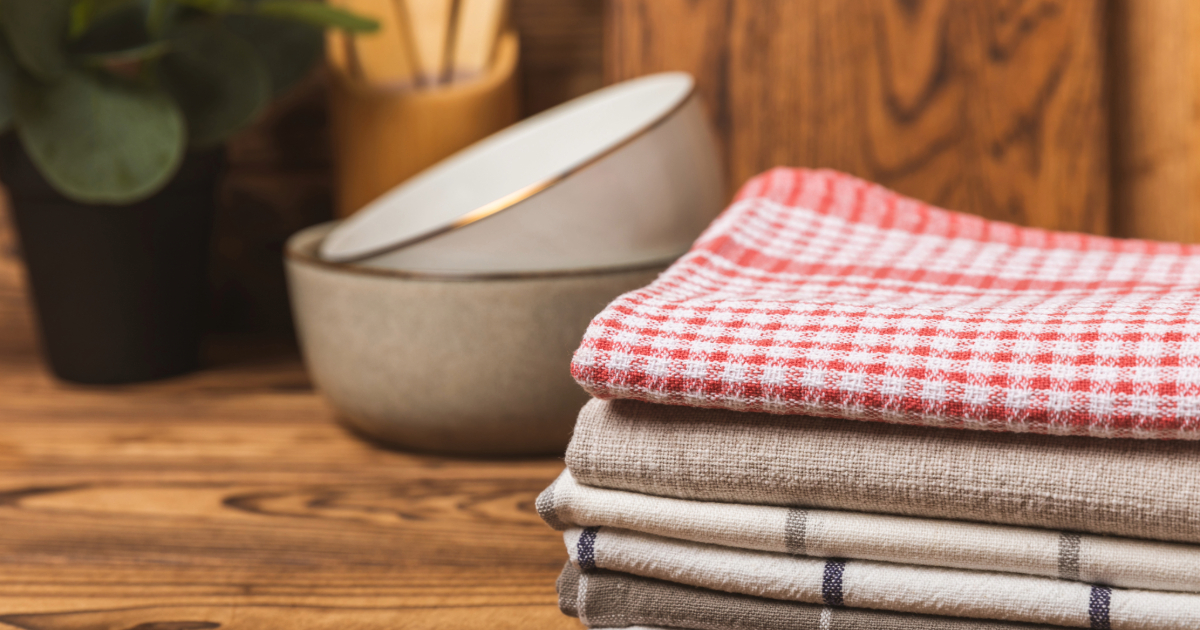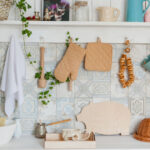Kitchen towels are a kitchen essential. They are useful for drying dishes, wiping up spills, grabbing hot pots and pans, and drying hands. Having a stash of high-quality, absorbent kitchen towels on hand makes cooking and cleaning easier.

When it comes to choosing the best fabric for kitchen towels, cotton is the clear winner. Cotton offers the right balance of absorbency, durability, affordability, and versatility that a good kitchen towel needs.
Why Cotton Is the Best Fabric for Kitchen Towels
There are several reasons why cotton is the preferred fabric for kitchen towels:
For all these reasons, cotton reigns supreme when it comes to the best fabric for kitchen towels. while materials like microfiber or linen have benefits, cotton offers the ideal balance of absorbency, durability, comfort and versatility.
Weave Styles for Kitchen Towels
While 100% cotton is the best base material, the weave style also affects the characteristics and performance of kitchen towels. Here are some common weaves used for cotton kitchen towels:
Consider the planned uses for your kitchen towels when picking a weave style. Terry cloth and waffle weave are the most versatile options for everyday kitchen tasks.
Key Takeaway: Terry cloth and waffle weave cotton are the best weave styles for absorbent and versatile kitchen towels.
Thread Count for Kitchen Towels
Thread count refers to the number of threads woven into a square inch of fabric. A higher thread count generally means a denser, softer, and more durable fabric. However, thread count does not guarantee quality on its own.
For kitchen towels, a good thread count range is 200-300. Towels with a thread count in this range provide great absorption and durability without being too heavy or rough. Going below 200 can compromise quality and absorption. Exceeding 300 thread count does not necessarily improve performance – it may just increase cost.
Within the 200-300 range, you can find high-quality cotton kitchen towels suitable for all your needs. Focus less on maximum thread count and more on overall construction and durability.
The Best Cotton Fabrics for Kitchen Towels
When shopping for cotton kitchen towels, look for 100% cotton with a weight and weave that will be absorbent, durable, and lint-free. Here are some top recommendations:
No matter which you choose, focus on 100% cotton with a weight and weave suited to your needs. Combine styles to make a versatile kitchen towel set.
Choosing the Right Size for Kitchen Towels
Most standard cotton kitchen towels range from 15 x 25 inches up to 20 x 30 inches. Bar mops and flour sack towels tend to be smaller and larger, respectively.
Choose the size based on your intended uses:
Buy different sizes for different tasks, or opt for the standard size as a versatile middle ground.
Smart Design Features
Look for kitchen towels with design features that enhance functionality:
Prioritize fabrics and weaves first, then look for smart design features that will maximize usefulness.
Caring for Cotton Kitchen Towels
To get the most life from cotton kitchen towels:
With proper care, high-quality 100% cotton kitchen towels can provide years of reliable service.
Choosing Kitchen Towels with Long-Term Savings in Mind
Kitchen towels take a beating, so buying in bulk helps ensure you always have extras on hand. Buying towels in multi-packs also offers cost savings over time.
For the best value:
With some smart bulk purchasing of cotton kitchen towels, you’ll be set for years of cooking and cleaning tasks.
| Towel Material | Absorbency | Durability | Lint-Free | Heat Resistance | Cost |
|---|---|---|---|---|---|
| Cotton | Excellent | Excellent | Good | Excellent | Low |
| Linen | Good | Excellent | Excellent | Good | High |
| Microfiber | Good | Good | Excellent | Poor | Low |
Key Takeaway: Cotton rates highest across all factors – absorbency, durability, heat resistance, cost – that matter for great kitchen towels.
FAQs
What are the best cotton fabrics for kitchen towels?
The best cotton fabrics are canvas, terry cloth, flannel, and waffle weave. These fabrics offer the right blend of absorbency, durability, softness, and texture for great kitchen towels.
Should I buy cotton towels in bulk?
Yes, buying cotton kitchen towels in bulk packs of 3 or more is recommended. The per towel cost is lower and it ensures you always have extras on hand when some are dirty.
How often should I wash cotton kitchen towels?
Cotton kitchen towels should be washed frequently, ideally after each use. At a minimum wash them at least once per week to sanitize and remove stains. Hot water wash cycles are best.
Can I use fabric softener on cotton kitchen towels?
No, skip the fabric softener on kitchen towels. Fabric softeners can coat the fibers and impede absorbency. Softening cotton towels is not necessary.
How should I dry cotton kitchen towels?
Tumble dry cotton kitchen towels on low heat to avoid excessive shrinkage. Remove them promptly from the dryer after cycle ends and fold or hang immediately to prevent wrinkling.
Conclusion
When choosing the best fabric for kitchen towels, cotton is the best for its great absorbency, durability, comfort, and versatility.
Go with a high-quality 100% cotton towel in a weave like terry, waffle, or canvas. For maximum usefulness, buy cotton towels in bulk packs so you always have enough clean ones on hand.
With high-quality cotton kitchen towels that receive frequent laundering, you’ll be equipped to efficiently tackle any cooking or cleaning task.








